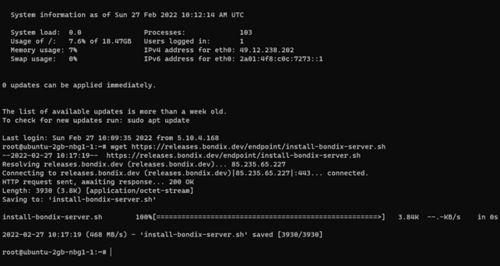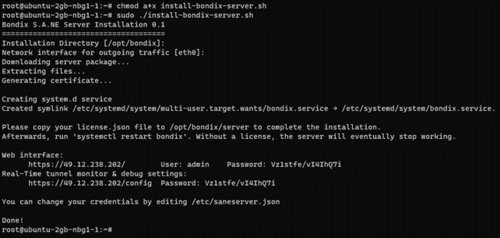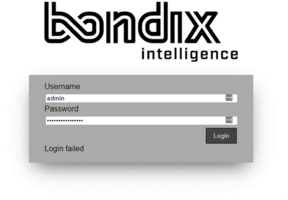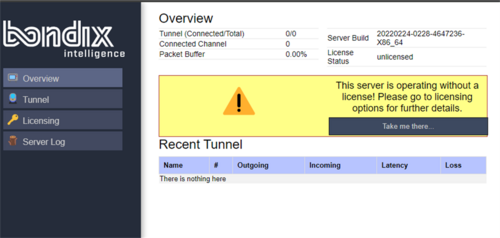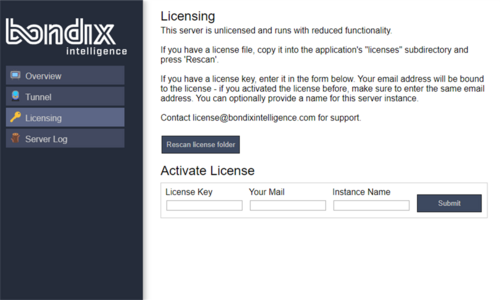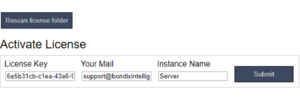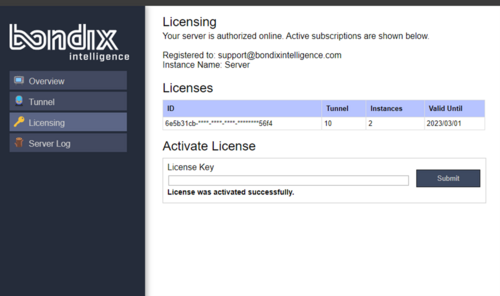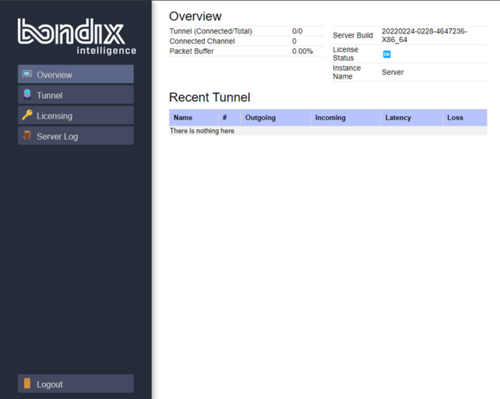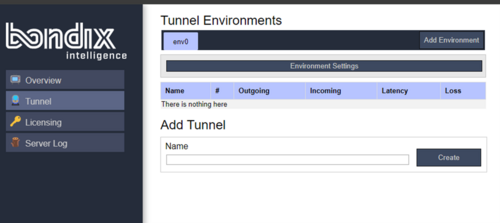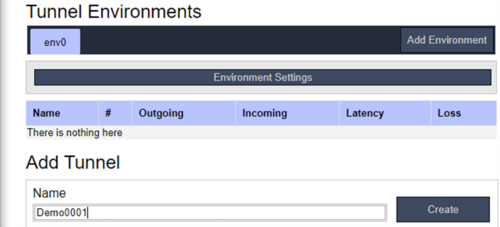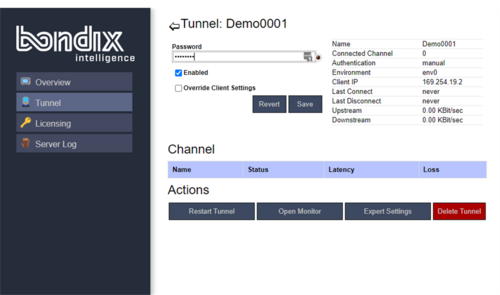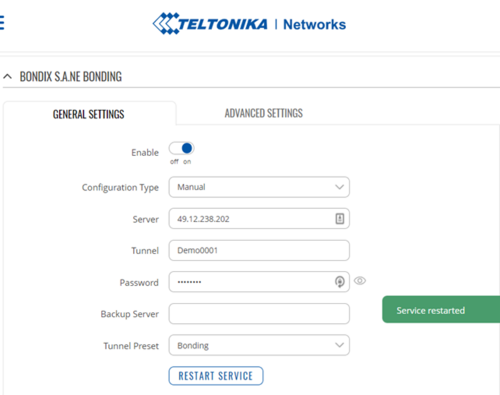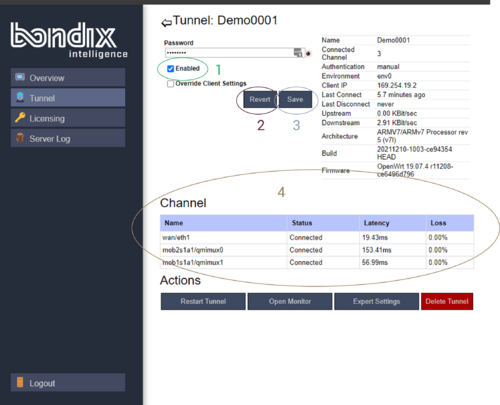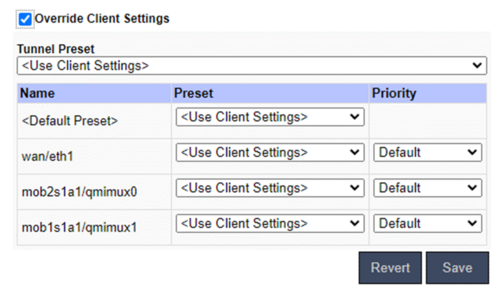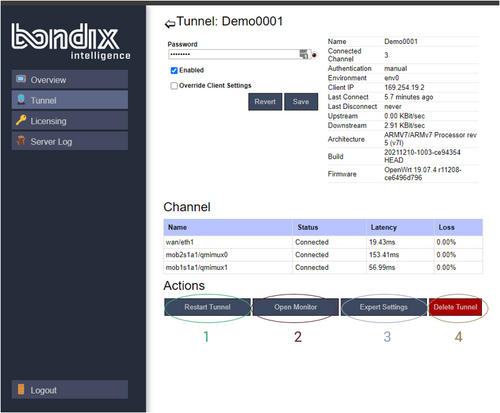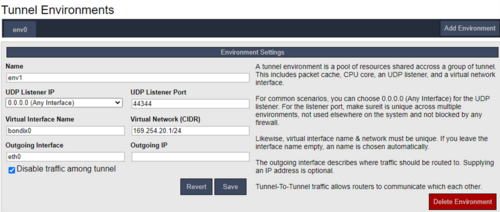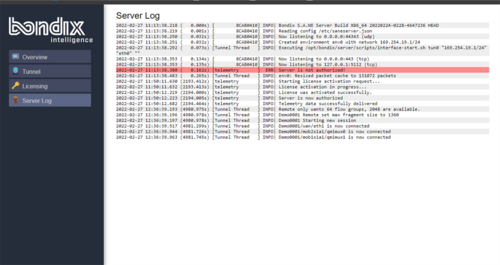Manuals/Sane-server-v01: Difference between revisions
(Created page with "== Preparations == To install the Bondix S.A.NE Server, you will need a few minutes of stable Internet, a web browser, and possibly some coffee or tea. === Supported Browsers === The following browsers have been tested to function properly with Bondix S.A.NE: * Google Chrome * MS Edge * Mozilla Firefox === Installing the Linux VM (Ubuntu 20.4) === ⚠️ '''For the installation, you will need root rights.''' Set your firewalls to the following settings: <nowiki>S....") |
|||
| (16 intermediate revisions by the same user not shown) | |||
| Line 1: | Line 1: | ||
[[Category:Server]] | |||
[[Category:Manual]] | |||
[[Main_Page|Start]] > [[Main_Page#Marketing_Material|Marketing Material]] > [[Manuals|Manuals]] > [[Manuals/Sane-server-v01|S.A.NE Server v01]] | |||
== Preparations == | == Preparations == | ||
To install the Bondix S.A.NE Server, you will need a few minutes of stable Internet, a web browser, and possibly some coffee or tea. | To install the Bondix S.A.NE Server, you will need a few minutes of stable Internet, a web browser, and possibly some coffee or tea. | ||
| Line 7: | Line 11: | ||
* MS Edge | * MS Edge | ||
* Mozilla Firefox | * Mozilla Firefox | ||
=== Updating the S.A.NE Server === | |||
If you want to update your Bondix S.A.NE server version, first delete the old installation scripts on your Linux VM by using the following command: | |||
<nowiki>rm install-bondix-server.sh*</nowiki> | |||
After that, just repeat the installation process as described above. | |||
⚠️ '''This will NOT delete your server configuration! It will only delete the installation scripts and a recommended measure before updating your server.''' ⚠️ | |||
=== Installing the Linux VM (Ubuntu 20.4) === | === Installing the Linux VM (Ubuntu 20.4) === | ||
⚠️ '''For the installation, you will need root rights.''' | ⚠️ '''For the installation, you will need root rights.''' ⚠️ | ||
Set your firewalls to the following settings: | Set your firewalls to the following settings: | ||
| Line 21: | Line 34: | ||
Execute the following script in the terminal window of your server to download the latest version of the S.A.NE server: | Execute the following script in the terminal window of your server to download the latest version of the S.A.NE server: | ||
<nowiki>wget https://releases.bondix.dev/endpoint/install-bondix-server.sh</nowiki> | <nowiki>wget https://releases.bondix.dev/endpoint/install-bondix-server.sh</nowiki> | ||
<gallery widths="500" heights="300"> | |||
File:1-linux-install.png | |||
</gallery> | |||
To start the installation, enter the following commands: | To start the installation, enter the following commands: | ||
| Line 28: | Line 45: | ||
Confirm all the following prompts with the Enter key for a standard installation. | Confirm all the following prompts with the Enter key for a standard installation. | ||
After completing the installation, you can reach S.A.NE server web interface at the IP address shown. Log in with the username “admin” and the password previously generated during installation. | <gallery widths="500" heights="300"> | ||
File:2-linux-install.png | |||
</gallery> | |||
After completing the installation, you can reach S.A.NE server web interface at the IP address shown. Log in with the username “admin” and the password previously generated during installation. | |||
<gallery widths="300" heights="200"> | |||
File:3-login.png | |||
</gallery> | |||
== Bondix S.A.NE Server == | == Bondix S.A.NE Server == | ||
=== Licensing === | === Licensing === | ||
If your server is not already licensed, you first need to activate the S.A.NE Server Tunnel license under the menu item “Licensing”. | If your server is not already licensed, you first need to activate the S.A.NE Server Tunnel license under the menu item “Licensing”. | ||
<gallery widths="500" heights="300" perrow="2"> | |||
File:4-nolicense.png | |||
File:5-activate-license.png | |||
</gallery> | |||
Enter the S.A.NE license key here, as well as a valid email address to which the license key is bound. You can also enter a name for the server instance here. Then press “Submit”. | Enter the S.A.NE license key here, as well as a valid email address to which the license key is bound. You can also enter a name for the server instance here. Then press “Submit”. | ||
<gallery widths="300" heights="200"> | |||
File:6-license-key.png | |||
</gallery> | |||
After the successful activation, the Licensing overview will display the number of licensed tunnels as well as the expiry date of your active tunnel subscriptions with the respective expiry date and the maximum number of active server instances possible under this license number. | After the successful activation, the Licensing overview will display the number of licensed tunnels as well as the expiry date of your active tunnel subscriptions with the respective expiry date and the maximum number of active server instances possible under this license number. | ||
<gallery widths="500" heights="300"> | |||
File:7-successful-activation.png | |||
</gallery> | |||
You can add further additional tunnels/server instances at any time under the item “Activate License”. | You can add further additional tunnels/server instances at any time under the item “Activate License”. | ||
| Line 43: | Line 81: | ||
==== Overview ==== | ==== Overview ==== | ||
This is the web interface of a licensed S.ANE server. | This is the web interface of a licensed S.ANE server. | ||
<gallery widths="500" heights="500"> | |||
File:8-overview.png | |||
</gallery> | |||
==== Bondix S.A.NE Tunnels ==== | ==== Bondix S.A.NE Tunnels ==== | ||
| Line 48: | Line 90: | ||
===== Create a new S.A.NE tunnel ===== | ===== Create a new S.A.NE tunnel ===== | ||
⚠️ '''The tunnel name must not contain any spaces.''' | Navigate to the menu item “Tunnel”. Select the tunnel environment for which you want to create the tunnel by clicking the corresponding tab; the default is set to “env0”. Then, assign a unique tunnel name and press “Create”. | ||
⚠️ '''The tunnel name must not contain any spaces.''' ⚠️ | |||
<gallery widths="500" heights="300" perrow="2"> | |||
File:9-add-tunnel.png | |||
File:10-add-tunnel-detail.png | |||
</gallery> | |||
You will then automatically be navigated to the settings window of the newly created tunnel. There, set a password for establishing the connection, make sure that “Enabled” is ticked, and then press “Save”. | You will then automatically be navigated to the settings window of the newly created tunnel. There, set a password for establishing the connection, make sure that “Enabled” is ticked, and then press “Save”. | ||
<gallery widths="500" heights="300"> | |||
File:11-tunnel-added.png | |||
</gallery> | |||
Your tunnel is now displayed under the menu item “Overview”. You can access settings for each tunnel simply by clicking on the tunnel name. | Your tunnel is now displayed under the menu item “Overview”. You can access settings for each tunnel simply by clicking on the tunnel name. | ||
<gallery widths="500" heights="300"> | |||
File:12-tunnel-overview.png | |||
</gallery> | |||
===== Connect a compatible router to a S.A.NE server. ===== | ===== Connect a compatible router to a S.A.NE server. ===== | ||
Make sure that the latest Bondix S.A.NE client is installed on your router. Go to the settings menu of your router’s S.A.NE client and enter the server’s IP address and the tunnel name and password you created in chapter 3.2.2 in the corresponding fields. Save your entry and then restart the service (Restart Service). | Make sure that the latest Bondix S.A.NE client is installed on your router. Go to the settings menu of your router’s S.A.NE client and enter the server’s IP address and the tunnel name and password you created in chapter 3.2.2 in the corresponding fields. Save your entry and then restart the service (Restart Service). | ||
<gallery widths="500" heights="500"> | |||
File:13-tunnel-credentials.png | |||
</gallery> | |||
The tunnel is now listed in the S.A.NE server’s menu “Overview” including the number of its active connections. Click on the tunnel name to access the tunnel settings and options. | The tunnel is now listed in the S.A.NE server’s menu “Overview” including the number of its active connections. Click on the tunnel name to access the tunnel settings and options. | ||
<gallery widths="500" heights="300"> | |||
File:12-tunnel-overview.png | |||
</gallery> | |||
===== Tunnel details and settings ===== | ===== Tunnel details and settings ===== | ||
====== Functions ====== | ====== Functions ====== | ||
<gallery widths="500" heights="500"> | |||
File:14-functions.png | |||
</gallery> | |||
{| class="wikitable" | {| class="wikitable" | ||
! Function !! Effect | ! Function !! Effect | ||
| Line 75: | Line 143: | ||
|} | |} | ||
''' Function “Override Client Settings” ''' | |||
If you activate this on server side, local tunnel presets and WAN priority settings of the connected router are overwritten or reset by the server’s S.A.NE. You will need to restart the tunnel. | If you activate this on server side, local tunnel presets and WAN priority settings of the connected router are overwritten or reset by the server’s S.A.NE. You will need to restart the tunnel. | ||
<gallery widths="500" heights="300"> | |||
File:15-override-client-settings.png | |||
</gallery> | |||
====== Actions ====== | ====== Actions ====== | ||
<gallery widths="500" heights="500"> | |||
File:16-actions.png | |||
</gallery> | |||
{| class="wikitable" | {| class="wikitable" | ||
! Function !! Effect | ! Function !! Effect | ||
| Line 96: | Line 173: | ||
====== Add Environments ====== | ====== Add Environments ====== | ||
During the S.A.NE server installation, the software automatically creates a default environment with the name “env0”. You can create and add further environments via the menu item “Add Environment”. | During the S.A.NE server installation, the software automatically creates a default environment with the name “env0”. You can create and add further environments via the menu item “Add Environment”. | ||
<gallery widths="500" heights="300"> | |||
File:17-tunnel-environments.png | |||
</gallery> | |||
====== UDP Listener settings ====== | ====== UDP Listener settings ====== | ||
For common scenarios, select “0.0.0.0 (Any Interface)” for the UDP Listener IP. | For common scenarios, select “0.0.0.0 (Any Interface)” for the UDP Listener IP. | ||
⚠️ '''Each environment must be assigned its own unique UDP Listener Port. This port must not be used elsewhere in the system, and it must not be blocked by a firewall.''' | |||
⚠️ '''Each environment must be assigned its own unique UDP Listener Port. This port must not be used elsewhere in the system, and it must not be blocked by a firewall.''' ⚠️ | |||
====== Virtual Interface settings ====== | ====== Virtual Interface settings ====== | ||
Leave the Virtual Interface Name blank to automatically generate a name for it. | Leave the Virtual Interface Name blank to automatically generate a name for it. | ||
⚠️ '''The Virtual Interface Name and the Virtual Network (CIDR) assigned to the Tunnel Environment must also be unique, not to be used in any other environment.''' | |||
⚠️ '''The Virtual Interface Name and the Virtual Network (CIDR) assigned to the Tunnel Environment must also be unique, not to be used in any other environment.''' ⚠️ | |||
====== Outgoing settings ====== | ====== Outgoing settings ====== | ||
| Line 129: | Line 212: | ||
== Bondix Server Log == | == Bondix Server Log == | ||
This is an exemplary overview of a server’s current log messages: | This is an exemplary overview of a server’s current log messages: | ||
<gallery widths="500" heights="300"> | |||
File:18-server-log.png | |||
</gallery> | |||
== Download == | |||
Download this manual as a PDF file from here: [https://bondixintelligence.sharepoint.com/:b:/s/BondixIntelligenceCoreTeam/ETzIJiPTEnFNkHPDsR_Fa54BUefrowdEGuaKzl_QR2PH2w?e=iTGhiP bondix_server_manual_v1_202202.pdf] | |||
Latest revision as of 14:48, 10 November 2023
Start > Marketing Material > Manuals > S.A.NE Server v01
Preparations
To install the Bondix S.A.NE Server, you will need a few minutes of stable Internet, a web browser, and possibly some coffee or tea.
Supported Browsers
The following browsers have been tested to function properly with Bondix S.A.NE:
- Google Chrome
- MS Edge
- Mozilla Firefox
Updating the S.A.NE Server
If you want to update your Bondix S.A.NE server version, first delete the old installation scripts on your Linux VM by using the following command:
rm install-bondix-server.sh*
After that, just repeat the installation process as described above.
⚠️ This will NOT delete your server configuration! It will only delete the installation scripts and a recommended measure before updating your server. ⚠️
Installing the Linux VM (Ubuntu 20.4)
⚠️ For the installation, you will need root rights. ⚠️
Set your firewalls to the following settings:
S.A.NE server port shares - TCP: 443, 80 - UDP: 44343 SSH (Optional): 22
Make sure your server has a public static IP and is reachable from the Internet.
Execute the following script in the terminal window of your server to download the latest version of the S.A.NE server:
wget https://releases.bondix.dev/endpoint/install-bondix-server.sh
To start the installation, enter the following commands:
chmod a+x install-bondix-server.sh sudo ./install-bondix-server.sh
Confirm all the following prompts with the Enter key for a standard installation.
After completing the installation, you can reach S.A.NE server web interface at the IP address shown. Log in with the username “admin” and the password previously generated during installation.
Bondix S.A.NE Server
Licensing
If your server is not already licensed, you first need to activate the S.A.NE Server Tunnel license under the menu item “Licensing”.
Enter the S.A.NE license key here, as well as a valid email address to which the license key is bound. You can also enter a name for the server instance here. Then press “Submit”.
After the successful activation, the Licensing overview will display the number of licensed tunnels as well as the expiry date of your active tunnel subscriptions with the respective expiry date and the maximum number of active server instances possible under this license number.
You can add further additional tunnels/server instances at any time under the item “Activate License”.
Administration
Overview
This is the web interface of a licensed S.ANE server.
Bondix S.A.NE Tunnels
To connect a S.A.NE-compatible router to a S.A.NE server, you first need to create a tunnel for this respective router. Only then does the server know that there will be a new router to receive data from and send data to.
Create a new S.A.NE tunnel
Navigate to the menu item “Tunnel”. Select the tunnel environment for which you want to create the tunnel by clicking the corresponding tab; the default is set to “env0”. Then, assign a unique tunnel name and press “Create”.
⚠️ The tunnel name must not contain any spaces. ⚠️
You will then automatically be navigated to the settings window of the newly created tunnel. There, set a password for establishing the connection, make sure that “Enabled” is ticked, and then press “Save”.
Your tunnel is now displayed under the menu item “Overview”. You can access settings for each tunnel simply by clicking on the tunnel name.
Connect a compatible router to a S.A.NE server.
Make sure that the latest Bondix S.A.NE client is installed on your router. Go to the settings menu of your router’s S.A.NE client and enter the server’s IP address and the tunnel name and password you created in chapter 3.2.2 in the corresponding fields. Save your entry and then restart the service (Restart Service).
The tunnel is now listed in the S.A.NE server’s menu “Overview” including the number of its active connections. Click on the tunnel name to access the tunnel settings and options.
Tunnel details and settings
Functions
| Function | Effect |
|---|---|
| 1 Enabled | Activates (ticked) or deactivates (unticked) the tunnel. |
| 2 Revert | Undoes any changes that have not yet been saved. |
| 3 Save | Saves changes. |
| 4 Channel | Provides an overview of channels currently connected. |
Function “Override Client Settings” If you activate this on server side, local tunnel presets and WAN priority settings of the connected router are overwritten or reset by the server’s S.A.NE. You will need to restart the tunnel.
Actions
| Function | Effect |
|---|---|
| 1 Restart tunnel | Allows the tunnel connection to be disconnected briefly and then reconnected. This is needed for some changes to take effect. |
| 2 Open Monitor | Displays a graphical overview of the connections of the router. |
| 3 Expert Settings | Opens the server-side Bondix S.A.NE web monitor for diagnostic purposes. |
| 4 Delete Tunnel | Deletes a tunnel permanently without the possibility to restore it. |
Tunnel Environments
In Bondix S.A.NE, a tunnel environment is a pool of resources used by a group of tunnels. This includes packet cache, CPU core, a UDP listener, and a virtual network interface.
Add Environments
During the S.A.NE server installation, the software automatically creates a default environment with the name “env0”. You can create and add further environments via the menu item “Add Environment”.
UDP Listener settings
For common scenarios, select “0.0.0.0 (Any Interface)” for the UDP Listener IP.
⚠️ Each environment must be assigned its own unique UDP Listener Port. This port must not be used elsewhere in the system, and it must not be blocked by a firewall. ⚠️
Virtual Interface settings
Leave the Virtual Interface Name blank to automatically generate a name for it.
⚠️ The Virtual Interface Name and the Virtual Network (CIDR) assigned to the Tunnel Environment must also be unique, not to be used in any other environment. ⚠️
Outgoing settings
The Outgoing Interface describes where you want to route your data traffic. Optionally, you can enter a specific Outgoing IP address.
Activate Tunnel-to-Tunnel Communication
The option “Disable traffic among routers” is activated by default due to Bondix S.A.NE providing multi-tenancy support. This feature prevents routers assigned to a Tunnel Environment from communicating with each other. If you deactivate “Disable traffic among routers”, routers in the same environment can interact. You can adjust this setting separately for each environment.
Troubleshooting
Sometimes, your Bondix S.A.NE server will not work as expected. If that happens, you may find possible solutions in this section.
| Problem | Solution |
|---|---|
| ? | Re-install Server (Update) |
| ? | Remove Server |
| ? | Start Bondix Service |
| ? | Stop Bondix Service |
| ? | Server update notification in Web interface update via console |
Bondix Server Log
This is an exemplary overview of a server’s current log messages:
Download
Download this manual as a PDF file from here: bondix_server_manual_v1_202202.pdf
